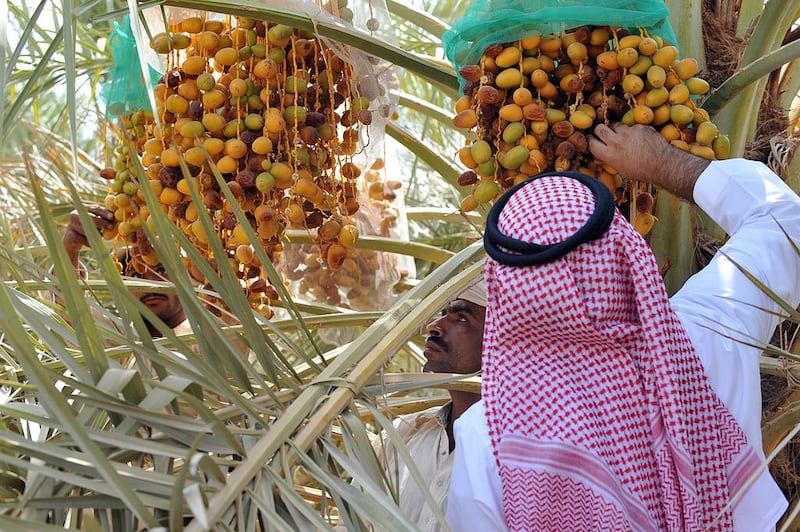Saudi Arabia has another highly exportable commodity – dates. However, unlike its crude oil which is marketed around the world, its date produce is primarily exported closer to home, to the UAE.
Saudi Arabia is among the top three global producers of dates – and production is steadily on the rise in the kingdom. The world’s annual date harvest is estimated at more than 6 million tonnes by the Food and Agriculture Organization. The kingdom produced in excess of 1.1 million tonnes of dates in 2014 and has over 25 million palm trees, the then-deputy agriculture minister Khalid Al Fehaid stated. Egypt produces the most with a 19 per cent global share and about 1.5 million tonnes. Iran and Saudi Arabia each have about 14 per cent of the overall market.
Productive date palms cover 157,000 hectares of national land and Saudi Arabia grows over 300 types of dates. Not only do date palms hold a prominent position in the Saudi emblem or coat of arms, the tree and its fruit both hold a distinct honour in the tradition, culture – and economy of the country.
The fruit remains high in demand at home, however, and only about 6.8 per cent of date production is marketed externally according to 2013 figures.
And the UAE is the main export market for Saudi dates – importing about 61 per cent.
Omar AbuElSoud, part of the AlQasim-based ElBawardy Dates sales team at the Saudi pavilion at Dubai’s Global Village says that events in the Emirates offer an opportunity to market his produce to an international customer base. “We come here to advertise our products – 15 types of dates and 20 types of mamoul,” Mr AbuElSoud says, referring also to the popular traditional buttery cookies stuffed with a smooth date filling.
“We get to know a lot of people here, we learn how to deal with every kind of nationality – we don’t get this in other places”. The company has several outlets across the UAE.
Demand for dates, especially Saudi dates, will remain almost inelastic to a degree because of the fruits’ prominent role in Ramadan fasting tradition and Islamic culture overall. For example, the most fabled, and revered, of all oases are in Islam’s second most holy city Medina, where the ajwa date grows. Also called the king of dates, it offers particular health benefits.
Unsurprisingly then, wherever there are Muslim populations there is a particular demand for dates.
Adnan Al Bahrani, chief executive of Investment Opportunities for Trading, exports a significant amount of its date produce to the Indian market.
The date processing company exports almost all its 7,000 tonnes of annual production and related products such as date syrup, vinegar and paste.
Mr Al Bahraini’s company operates in the kingdom’s Al Ahsa region – which is said to be home to the world’s largest oasis – with ideal climatic conditions and an abundant water table, it alone boasts over 10 million palms.
The gourmet date segment is a growing “fringe” of the existing market offering a more traditional substitute for gifts and attracting a wider customer base with enticingly presented value added products like chocolate-dipped or coffee-laced dates.
At its Al Ghat – Arabic for the sound of running water – date groves, the prominent date brand Bateel draws on tradition to ensure gourmet-standard produce with cultivation techniques emphasising natural methods over chemical intervention. Its 50,000 date trees produce more than 20 varieties – with some trees as old as 70 years.
“Dates encapsulate the heart of desert life: endurance, persistence, patience and hospitality. Dates have been part of the culture of this region for centuries,” says Ata Atmar, managing director at Bateel International. The company also seems poised for strong expansion beyond its core markets in the Gulf – endorsing robust export potential for the industry.
The farm-based team hand-prune, thin, wrap protective bagging on maturing fruit and hand-harvest the produce in multiple stages. Cumulatively, they scale the palm trees a dozen times every season to facilitate a high quality yield – avoiding the use of pesticides.
business@thenational.ae
Follow The National's Business section on Twitter





